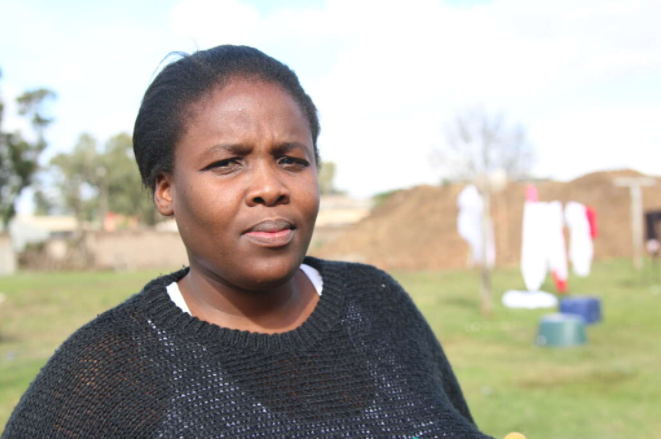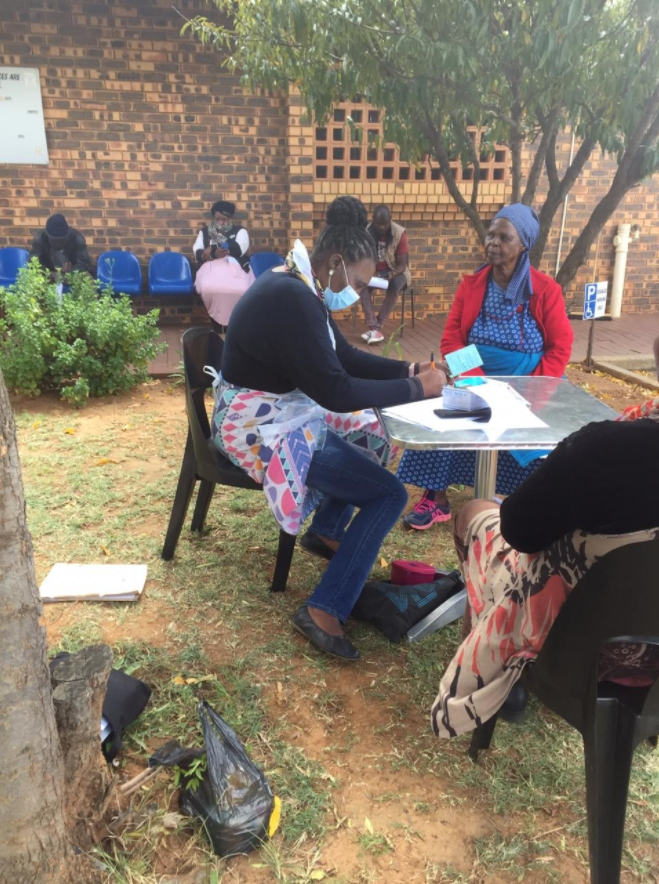Nyhet 2020-04-22
The Unsung Heroes in the Covid-19 Crisis
Numerous studies and reviews have been conducted and reported on the plight that Community Healthcare Workers (CHWs) in Southern Africa are faced with. CHWs are predominantly women with no formally certified professional education; however, have undergone training(s) to equip them in the delivery of primary health care services. A 2019 research report for Afrikagrupperna titled The World of Work of Community Health Workers by The Feminist Research Collective, vividly depicts the toils and inequities that are endured by CHWs across South Africa. This report also records shared realities of the adversities, risks and injustices of their working environment and lives which have been disregarded by the State. The jostling relationship between the State and this valuable community resource is a historic one, spanning over two decades. Post 1994 during the peak of the HIV and AIDS pandemic, saw CHWs deployed to focus particularly on HIV, AIDS and tuberculosis (TB) care, treatment and support in communities, exposing the fragility of the public health system. In present day, faced with Covid-19, a different type of pandemic and yet again the CHWs are serving on the frontline to help fight the virus in their respective communities and around the country.
In South Africa, a vast majority of CHWs are from the marginalized working-class communities they serve. These communities are plagued with (amongst others) extreme poverty, limited medical resources, poor health facilities, shortages of certified health professionals, unemployment and a high rate of people living with infectious diseases. As members of their respective communities, CHWs face the same social inequalities and dire conditions in which they actively work to improve the communities’ access to primary healthcare. The right to have access to health care services is a basic human right guaranteed by the Constitution; albeit without the role played by CHWs this right will remain out of reach for millions of the population. Despite serving as the mainstay of the national health system; there are over 70 000 CHWs nationally working on a “volunteer” basis because the State refuses to recognize them as employees of the Department of Health (DoH). This remains the status of the CHWs even after the 2018 Labour Court ruled in favour of them being recognized as employees of DoH in the Gauteng province. The CHWs were awaiting official recognition by 1 April 2020 from the Gauteng Health Member of Executive Council (MEC), before the coronavirus (covid-19) pandemic threw an unfamiliar spanner in the works.
As the global covid-19 pandemic loomed within our borders Cyril Rhamaposa, the President announced a State of Disaster followed by an effect of a national lockdown. The State’s immediate plan of action in response to covid-19 is centred around testing, screening and tracing civilians for the virus. Who better to perform this mammoth task, than the existing pillar carrying the marginalized communities which will be hit hardest? The CHWs were called to serve on the frontlines with minimal training, no protective gear (PPE) and simple instructions to make their own masks. This tactless approach not only exacerbates the risks that the CHWs face daily but also that of the lives of their families and communities. These are the same communities that do not have running water to continually wash their hands, nor the luxury of space for self-isolation or room for self-quarantine, which are recommended measures to curb the spreading of the virus. Whilst this is uncharted territory, some research findings says that a person can get infected with the virus yet remain asymptomatic for up to 14 days; but can be a carrier of the virus during this period. Thus, deploying people to the frontline without the basic tools for them to protect themselves is a strategy that will likely hamper the efforts to curtail the growing infection rate, regardless of social status. A prevalent example is that of the temporary closure of two private hospital in KwaZulu-Natal province (KZN) due to a staggering number of staff testing positive for the virus; as well as another private hospital in an upper-class neighbourhood in Gauteng province. To date, statistics also show that the KZN province has the highest number of covid-19 fatalities in the country.
The perplexing challenges set before CHWs of choosing to fight for their communities on the frontline or opting to stay home and be safe; is one that has brought on a level of fear and uncertainty. Three weeks into the lockdown and CHWs are still without adequate gear, amidst reports that donations of the PPE have been received by the DoH. South Africa’s main health workers’ union has taken steps to challenge the government in court over the lack of PPE for frontline staff as a surge in new coronavirus cases unfolds. The uncertainty of when the PPE will be distributed to those who need it most, along with not knowing if the Gauteng DoH will indeed recognize them as employees has cast despair upon CHWs’ lives and their livelihoods. With little hope in sight and their backs against the wall, CHWs around the country are still tirelessly dedicating themselves to play their crucial role in fighting for their communities against the virus.
Afrikagrupperna supports CHWs’ struggle for fair living conditions and self-organization in South Africa through the South African Care Workers Forum. CHW are a crucial unit that constitutes the foundation of the health care system in the country, but the work is unrecognized and carried out under dangerous circumstances, without compensation, safe working conditions nor protective equipment. During the corona pandemic, CHW are at the front line when the authorities temporarily need their workforce to test people for the virus.
The position of CHW in South Africa therefore needs to be recognized and approximately 70,000 CHW in South Africa should be entitled to a formal and long-term employment.
They are the real heroes in this war! We salute them, A luta continua!


Gör skillnad varje månad!
Det krävs inte mycket för att göra stor skillnad. Som medlem är du med och skapar varaktig förändring — månad efter månad. Ditt stöd kan ge grunden till en liten odling, öppna dörrar till utbildning eller ge rent vatten till utsatta familjer. Just nu finns det människor som, med ditt stöd, kan bygga en tryggare framtid för sina barn. Ditt månatliga stöd kan bli den möjlighet de behöver för en ljusare morgondag.